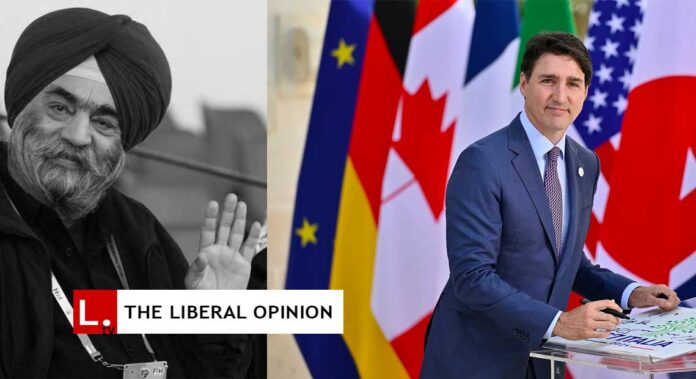Justin Trudeau to collect two pensions, $104K in severance
The former PM is entitled to one pension for his nearly 17 years as a Member of Parliament and a second for his decade as Prime Minister
“Should a retiring Prime Minister get two pensions?,” is the subject of an animated debate that has been set in motion by the Canadian Taxpayers Federation (CFT) as it released its calculations about the estimated pension and severance payments to be paid to 110 Members of Parliament who were either defeated or did not see re-election to the 45th House of Commons.
At least six members of the outgoing House of Indian descent who either lost the April 28 elections or decided not to seek re-election are among the beneficiaries. They are Chandra Arya, George Chahal, Kamal Khera, Harjit Singh Sajjan, Jagmeet Singh and Arif Virani.
While Chandra Arya, Harjit Singh Sajjan and Arif Virani did not contest, the remaining three – Jagmeet Singh, Kamal Khera and George Chahal – were defeated in the last federal elections held on April 28.
While releasing its calculations, the CFT said that “defeated or retiring MPs will collect about $5 million in annual pension payments, reaching a cumulative total of about $187 million by age 90. In addition, about $6.6 million in severance cheques will be issued to some former MPs.
“Former Prime Minister Justin Trudeau will collect two taxpayer-funded pensions in retirement. Combined, those pensions total $8.4 million, according to CTF estimates. Trudeau also takes a $104,900 severance payout because he did not run again as an MP.
“The payouts for Trudeau’s MP pension will begin at $141,000 per year when he turns 55 years old. It will total an estimated $6.5 million should he live to the age of 90. The payouts for Trudeau’s prime minister pension will begin at $73,000 per year when he turns 67 years old. It will total an estimated $1.9 million should he live to the age of 90,’ the CFT said in its statement.
Going by the statement, it not only gave details of all 110 Members of Parliament who will no more sit in the House of Commons but has also raised a pertinent question as to whether a retiring Prime Minister should be entitled to two pensions or the government should promulgate a law to end the second pension for all Prime Ministers.
“Taxpayers shouldn’t feel too bad for the politicians who lost the election because they will be cashing big severance or pension cheques,” said Franco Terrazzano, CTF Federal Director. “Thanks to past pension reforms, taxpayers will not have to shoulder as much of the burden as they used to. But there is more work to do to make politicians pay affordable for taxpayers.”
“Taxpayers need to see leadership at the top, and that means reforming pensions and ending the pay raises MPs take every year,” Terrazzano said. “A Prime Minister already takes millions through his/her first pension, he/she should not be billing taxpayers more for his/her second pension.
“The government must end the second pension for all future prime ministers.”
There are 13 former MPs who will collect more than $100,000-plus a year in pension income. The pension and severance calculations for each defeated or retired MP can be found.
Going by the CFT statement, four of the six members of the outgoing House of Indian descent, will be entitled to severance payments varying between Can $74000.00 and Can $ 1,54,000 besides getting a pension between Can $ 45000 and Can $ 77000.
George Chahal, who lost the election, would get a severance payment of Can $ 1,04,900. Kamal Khera, who was a federal minister and lost the April 28 election, would get the highest severance payments among MPs of Indian descent as she would be entitled to draw Can $ 1,54,850 as a severance payment.
Harjit Singh Sajjan, who also remained a federal minister in Justin Trudeau’s government, would draw the lowest severance payment as his entitlement has been worked out to be Can $ 74000.
Only MP of Indian descent to head a national party, Jagmeet Singh, who lost the April 28 election from Burnaby Centre in British Columbia, would get a severance payment of Can $ 1,40,300.00. Another federal minister in Justin Trudeau’s government, Arif Virani, would get a severance payment of Can $ 1,04,900.00.
Chandra Arya, whose candidature as Liberal candidate from Nepean was revoked, would now draw a pension of Can $ 53000, while pension of Jagmeet Singh will be Can $ 45000. The pension is calculated on the number of years a Member has served. Former federal ministers – Kamal Khera (Can $ 68000), Harjit Singh Sajjan (Can $ 77000) and Arif Virani (Can $ 66000) would also get pensions as former MPs.
Jagmeet Singh’s pension remained a subject of regular debates in the House of Commons when it took up no-confidence motions moved by the Conservatives against the minority Liberal government headed by Justin Trudeau. NDP led by Jagmeet Singh twice bailed out the government while the House took up no-confidence motions moved by the Leader of the Opposition, Pierre Poilievre, Incidentally, Pierre Poilievre, was also among the 110 MPs who either lost or did not contest the April 28 elections.
(Prabhjot Singh is a veteran journalist with over three decades of experience of 14 years with Reuters News and 30 years with The Tribune Group, covering a wide spectrum of subjects and stories. He has covered Punjab and Sikh affairs for more than three decades besides covering seven Olympics and several major sporting events and hosting TV shows.)



